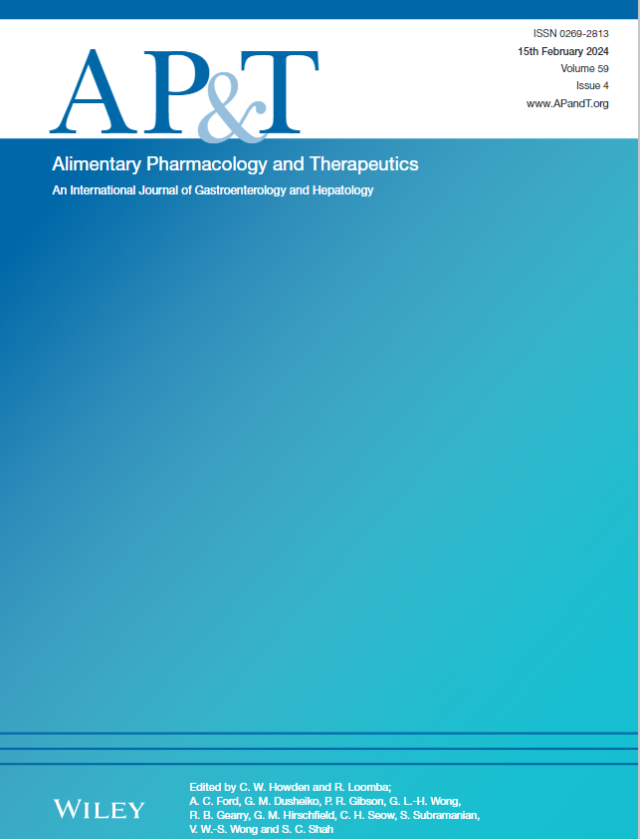Azathioprine or Tofacitinib as Maintenance Therapy in Corticosteroid‐Responsive Acute Severe Ulcerative Colitis
IF 6.6
1区 医学
Q1 GASTROENTEROLOGY & HEPATOLOGY
引用次数: 0
Abstract
BackgroundThe optimal maintenance therapy for patients with acute severe ulcerative colitis (ASUC) remains unclear.AimTo evaluate the efficacy of azathioprine and tofacitinib in maintaining remission in patients with ASUC who respond to intravenous corticosteroids.MethodsThis propensity score–matched, retrospective cohort study evaluated the effectiveness and safety of azathioprine and tofacitinib as maintenance therapies in adult patients with ASUC responding to intravenous corticosteroids. We recorded rehospitalisation, corticosteroid reuse, therapeutic escalation, and colectomy. The primary endpoint was cumulative event‐free survival at 1 year. Adverse events were documented in both treatment arms.ResultsWe included 115 patients in the final analysis (median age: 38 years [IQR: 28–49]; 54 females [46.95%]; 65 on azathioprine, 50 on tofacitinib). The cumulative probability of event‐free survival at 1 year was 44.0% with azathioprine and 75.0% with tofacitinib (log‐rank硫唑嘌呤或托法替尼作为皮质类固醇反应性急性重度溃疡性结肠炎的维持治疗
背景:急性重度溃疡性结肠炎(ASUC)患者的最佳维持治疗仍不清楚。目的评价硫唑嘌呤和托法替尼在维持静脉皮质激素应答的ASUC患者缓解的疗效。方法采用倾向评分匹配的回顾性队列研究,评估硫唑嘌呤和托法替尼作为维持治疗的有效性和安全性,用于静脉注射皮质类固醇的成人ASUC患者。我们记录了再住院、皮质类固醇再次使用、治疗升级和结肠切除术。主要终点是1年累积无事件生存期。两个治疗组均记录了不良事件。结果最终分析纳入115例患者(中位年龄:38岁[IQR: 28-49];女性54例[46.95%];硫唑嘌呤65,托法替尼50)。硫唑嘌呤组1年无事件生存率的累积概率为44.0%,托法替尼组为75.0% (log‐rank p = 0.01)。再住院率(15.4% vs 0%;P = 0.003)和治疗升级(13.8% vs . 2.0%;P = 0.02)显著高于硫唑嘌呤组。更多接受托法替尼治疗的患者获得症状缓解(40.0% vs 23.1%;P = 0.05),症状和生物标志物联合缓解(22.0% vs . 16.9%;P = 0.49)。不良事件55例(47.8%)。两组均无患者因不良事件需要停药。结论托法替尼作为类固醇反应性ASUC 1年的维持治疗比硫唑嘌呤更有效。
本文章由计算机程序翻译,如有差异,请以英文原文为准。
求助全文
约1分钟内获得全文
求助全文
来源期刊
CiteScore
15.60
自引率
7.90%
发文量
527
审稿时长
3-6 weeks
期刊介绍:
Alimentary Pharmacology & Therapeutics is a global pharmacology journal focused on the impact of drugs on the human gastrointestinal and hepato-biliary systems. It covers a diverse range of topics, often with immediate clinical relevance to its readership.

 求助内容:
求助内容: 应助结果提醒方式:
应助结果提醒方式:


